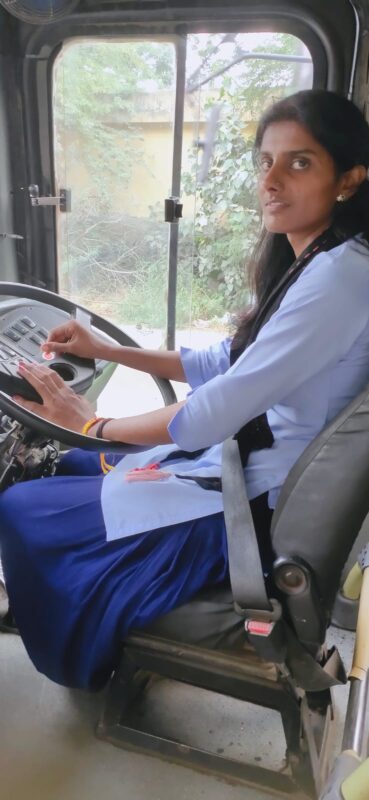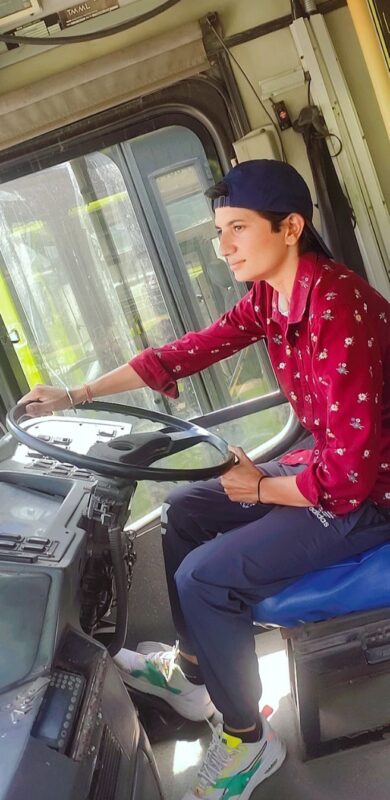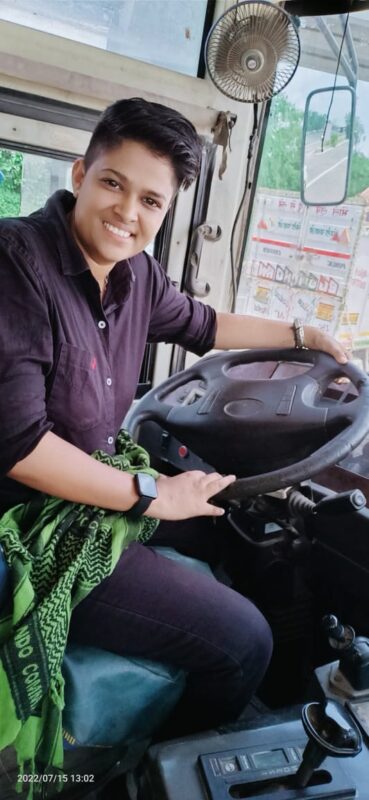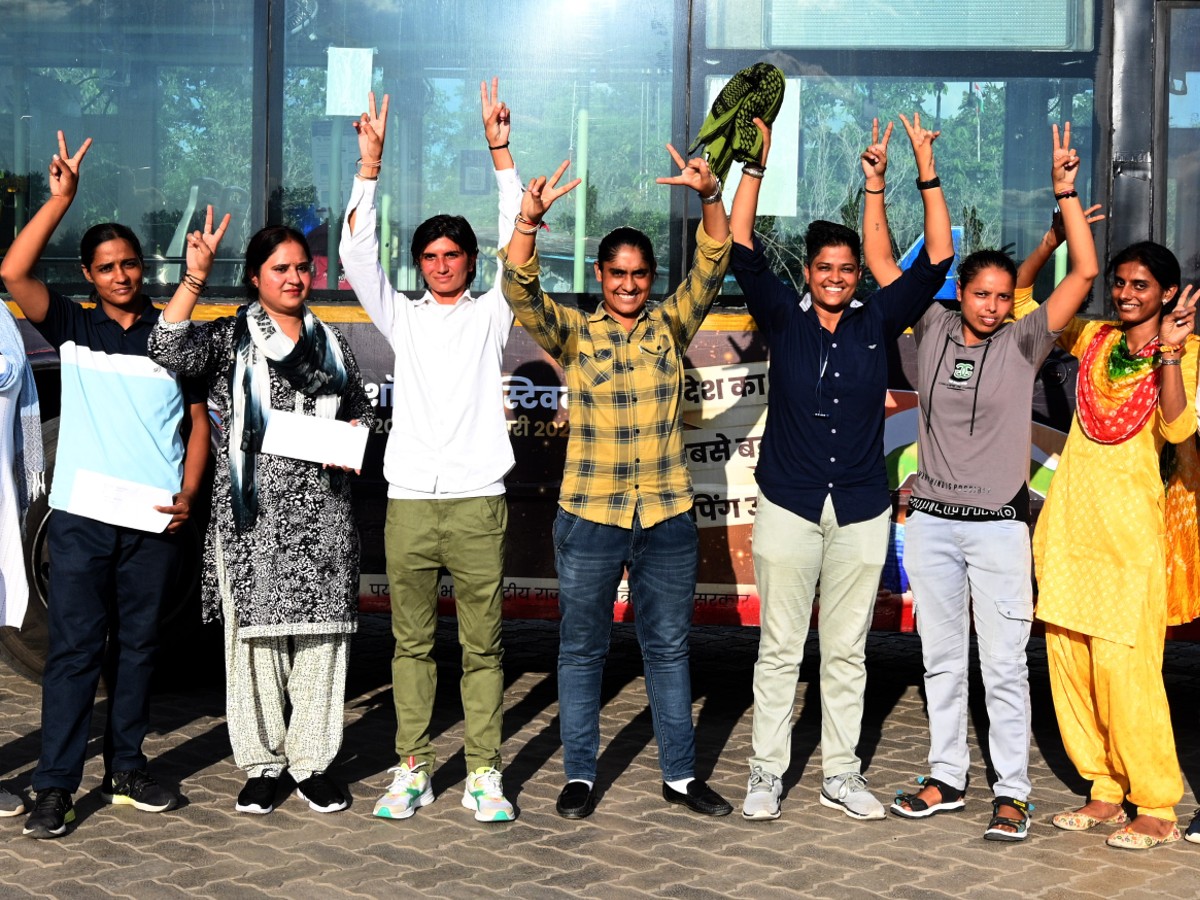Every day, at the break of dawn, 11 women slip into formal clothes and set out to drive public buses in Delhi, confident about their place in a “man’s world”. They are greeted with surprise, respect, encouragement and the usual stereotypical comments.
However, periodic challenges pose a barricade in their journey: For most of the women, access to toilets is an unaddressed issue.
On 23 August, Delhi Transport Minister Kailash Gahlot handed out letters of appointment to the 11 women drivers for buses registered with the Delhi Transport Corporation. They are deployed at various DTC depots such as Nangloi, Mundka, Peeragarhi, Nand Nagri and East Vinod Nagar.
Before embarking on this new journey, these 11 women had to undergo two months of training.
Absence of basics
When Komal Choudhary leaves home for duty, she ensures that she has used the bathroom before her eight-hour shift begins. In her head, she counts the number of times she may have to use the bathroom, and accordingly reduces her intake of water.
Choudhary climbs into the driver’s seat at 6:45 am from the Safdarjung bus terminal to Anand Vihar – a distance of 17.5 km. “It should not have to be a fight at all. We have to control our bladder for almost our entire shift, because even though there is a bathroom in Anand Vihar bus terminal, there is no arrangement for women. Besides, it is so dirty that it makes one feel pukish. We are unable to go there,” the 23-year-old complains.
There is no toilet at the Safdarjung terminal, she adds. “There are so few, almost non-existent, facilities for women. Men here relieve themselves anywhere, hence arrangements are made accordingly. And we are trying to fit in a man’s world. Women need the bathroom for several other reasons also,” she rues.

STEERING CLEAR: Komal Chaudhary takes the wheels
DTC began recruiting women drivers back in 2014 and for the past eight years, there have been scores of buses with women at its wheels.
Choudhary, who mostly drives on Route No. 543, says that even though their routes are rotational, the problem remains common for most.
Read more: Sexual crimes mar life in the capital
A resident of Rajasthan, Choudhary moved to Delhi after she was inducted as a bus driver by DTC. Before taking the wheel, she was studying to become a teacher. But she was always passionate about driving, which also drove her to apply for the job at DTC.
Her family is often troubled by neighbours back home by ‘demotivating’ questions on her whereabouts and capability or choice of work. “My neighbours and relatives often ask ‘Driver kaisa job hai, kahan rahegi, kya karegi (What kind of a job is driving, where will she stay or do)’ and why I didn’t become a teacher,” Choudhary says, emphasizing she has always received her family’s unconditional support.
Accompanying her in the bus are a conductor and ticket collector – all women.
When dreams are cut short
While 23-year-old Pooja Rani begins her day at 5 am with a round of boxing practice, 35-year-old Sharmila Sharma finishes off household chores.
Sharma, who usually drives on the Safdarjung to Mangolpuri route, wakes up early every day to prepare breakfast and lunch for her family, which comprises her children, husband and mother-in-law. She also packs food for herself.
When she returns home, she is thronged by her children. She then quickly changes her clothes to complete the rest of the household chores that she left unfinished in the morning.
“I am happy that I have a job now. We were paid Rs 12,000 during the training period, and are now waiting for our first proper salary. If they make us permanent employees, it will help us a lot,” Sharma says. Her husband is a labourer.
The 35-year-old was married off at the tender age of 14 and has been taking care of her family since. She has a 16-year-old son and a daughter in Class 9.
“You know, when you are a child bride, you don’t quite have the scope of dreams. Even though later in life I have received a lot of support from my husband, I don’t know what my life would have been if I didn’t have to look after a family and mother children from such a young age,” Sharma says.
But at one pint she did dream. “I wanted to become a police officer. I even sat for the state police exam, but didn’t clear it. Then I took the DTC test and I cleared, and look! Today, I am earning money,” she says.
Her ambitions are now focused on her children. “I want my son to be an Air Force officer and my daughter to be a police officer,” Sharma says.
Her hope is that she earns enough to sustain her family, bring food to the table and pay a rent of Rs 5,000.
‘Bhaiya roko’
Kiran has been driving the bus for over two weeks now, and often hears faint requests from passengers waiting on the road: “Bhaiya ji roko!”, which translates to ‘Brother, stop!’.
“They are so surprised when the bus stops and they discover that the driver is not a bhaiya. I honestly enjoy that,” Kiran laughs.

GEARED UP: Kiran is one among the 11 women setting an example for several others
The 23-year-old is a college student doing her Arts degree. She started driving her family i20 car since she was 18 and developed a love for vehicles. It didn’t take her long to make up her mind to go for a heavy vehicle.
Kiran is also an athlete, who has been running on the track for over a decade now. She has always been into physical activities and has received ample support from her village in Haryana.
Love, pride and salute
Pooja Rani is a 23-year-old boxer who has now joined as one of the drivers of the DTC buses. She wakes up in the wee hours and starts training for her game, which she has played at the national and state level both.
“I am a sportsperson. No one can take that away from me ever. I wake up early in the morning and do my first round of practice. Then, my second round begins after I return home. I go to play whenever my coach informs me of a tournament,” Pooja says.
Along with boxing, she has always enjoyed driving. Today, people shower “lots of love” on her. “I am so well accepted by people in my family and also those who see me drive on the road. I have no complaints. I thought my practice will get compromised after getting the job, but thankfully, I am managing it well,” she says. From Haryana, she moved to Delhi’s Mundka and lives with two other DTC drivers.
“Arey, log to dua de ke jaate hai (People bless us). I have always wanted to be an example for women. People don’t allow girls to go to school in our villages or play games. I did both. I play and I drive a bus. This encourages little girls and their parents,” she adds.
Niti Devi, 25, lost her job during the pandemic. Despite completing her BPEd and BEd, she was sitting idle at home for some time because there were no jobs. She then joined a private coaching centre where she taught History and Political Science classes, but it was not a full-time job.

ALL SMILES: Niti Devi at the driver’s seat
“Pehle job nahin thhi, aur ab dekho, log salute maarke jaate hai (At first, I didn’t have a job, and now, people salute me when they see me drive). Even traffic police officials show us a lot of support and love,” she says.
“When people first heard that I will drive a bus, initially ,they were like ‘Tum kar logi?’ (Will you be able to do it?) But now, they say it with so much pride,” she says.
She says she has no regret in leaving the teaching profession, because today, she is setting an example for others.
Instagram: instagram.com/thepatriot_in/
Twitter: twitter.com/Patriot_Delhi
Facebook: facebook.com/Thepatriotnewsindia





